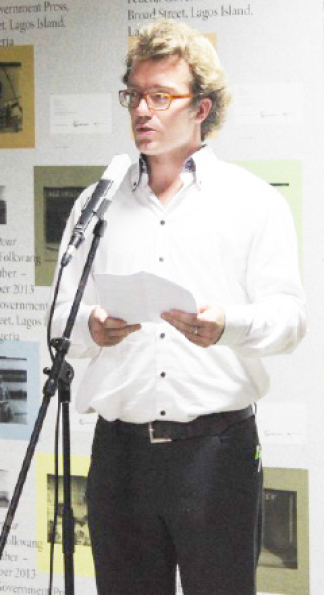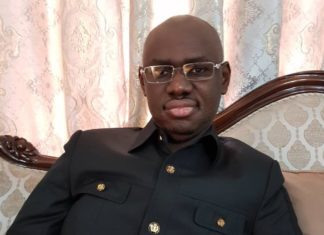Marc-Andre Schmachtel has had an interesting five and half years stay in Nigeria as Goethe-Institut’s director. In this interview with Assistant Life Editor, TERH AGBEDEH, he talks about the memories he will be leaving with as he returns on assignment to Germany.
In an earlier interview shortly after you arrived Nigeria, you said you would not touch the fish in the Lagos lagoon. Now on the verge of departure from the country, have you found an alternative?
I have found my alternative.
You want to share that with us?
The fish in the lagoon is, maybe sometimes, a bit tricky to get; so we get something from Falomo where there is a fish market.
What memories will you be taking home with you?
A lot of memories, actually. This is not easy to answer because it is a bit overwhelming. I mean, this festival (The Lagos Live Festival) is, for me, a way of taking something with me. I am leaving next week; the festival is this weekend (July 24-26). So all the experiences I have had in the last five and half years here are somehow culminating with this festival. I have a lot of partners that we worked with that are present as well at the festival. So, there are a lot of experiences for me, as well as information. But it is really hard to give you the exact names. More so with the quality of interactions we had with artistic partners, the artists, the cultural operators and so on. So, for me, going to a new place is always a difficult step, but I am familiar with the environment. I feel very good here in Lagos. But I have to leave now. So, really, leaving a familiar environment for somewhere else is a difficult step, but what I take with me from this place will help me a lot in settling in a new place.
They say that nobody ever leaves Lagos; will you come back?
I think there is some truth in it. I will definitely come back, yes.
The Federal Government Press building was something you really wanted to get; did you succeed with that?
We wanted to get it for the artists, and we are still working on it. I have had discussions with different partners on it and it is still something that will hopefully be happening in the next two or three years.
Yours is one of the organisations that do so much for culture in the country. But when you flip through the papers, often your stories are not there. How do you think you can correct that?
That is the issue when you have a small team. We don’t have a large team; I am head of the institute, head of the programmes department. I have a programme assistant. For two years now, we have a media and technical assistant, but that is it. So, for the programmes department, we are basically working with three persons. In other institutions, there are more people. It is something that we are aware of. It is not the best it could be and we could be more present, but we are trying our best to get the press involved.
Do you already know your successor?
I know my successor and he will be coming in this Friday. He will be here for an interim one year because the person that was supposed to succeed me could not come this year. But this person that is coming now will be there for one year.
Is arts and culture dead in Nigeria, and what can the federal government do to promote arts?
The fact that we are having this festival with so many Nigerian artists already proves that arts is not dead. There is no way that the arts or culture can be dead in Nigeria. There is so much activity actually and for me when we speak about what I am taking from Nigeria, it is the richness of artists, of the culture here.
Culture is always fluid. There is nothing static in it, as it is always evolving and changing every day. I think what we have here is that Nigerian artists showcase what was impossible 20 or 10 years ago, but it is possible now in 2016. Whether it is a public or private agency, arts institutions should be following this up. The artists are the ones that have the ideas, but the most important thing is that they find the environment where they can produce arts. This is the challenge in Nigeria; to have an environment that allows you to produce the art that you want to produce. But it is not easy. If you look at the National Museum, all the official structures that should promote arts are not always the way they should be. The ability to support artists is not always there. I think this is something both the public and private sides should really pay attention to. When you look at the Diaspora, the artists that are outside Nigeria, the art they produce in London, Paris and Berlin, would it be possible for it to be done here in Lagos? I am not sure, but the environment in Lagos is not so helpful and this is why this festival, for me, is important.
We try to promote Nigerian artists in Nigeria but, in fact, it is a Nigerian institution that should be doing this and not the Goethe-Institut. That is why I say that the environment is not that easy here. But the artists are very much alive; they are very much present and have important messages.
Is the project of mapping Lagos that you are part still on?
There are two projects, one is to have a map of Lagos with every culture institution represented with its activities, liveinlagos.org. It is still there; unfortunately, it is not really working. This was a very nice idea, but the problem was to really find human resource that would allow us to do it in a way that it should be.
But now, we have a second project which is a cultural guide on Lagos. This is something that we are still working on with partners here in Lagos and abroad. The first workshop will come up, hopefully, end of this year and the book will come out next year. But it will be a cultural map of Lagos as well.
Are you returning to Germany or going on to another station?
I am going back to the headquarters in Munich, Germany. I will be working with the film department there.













